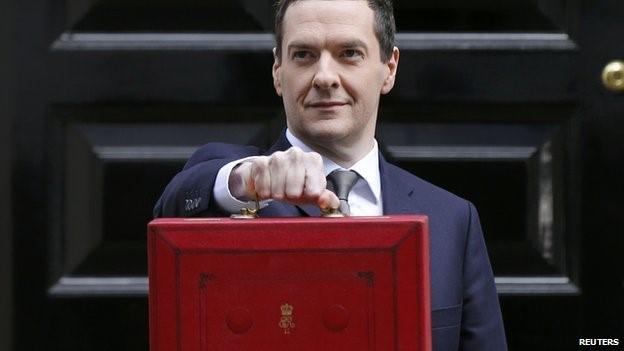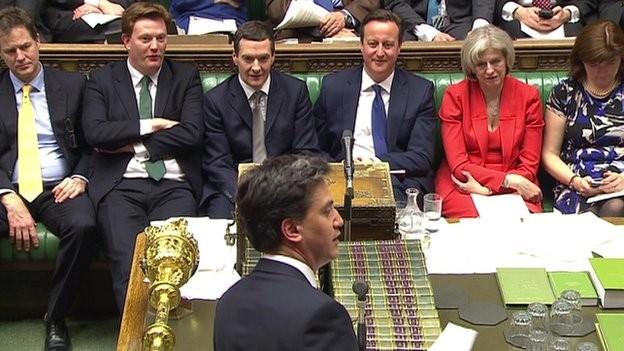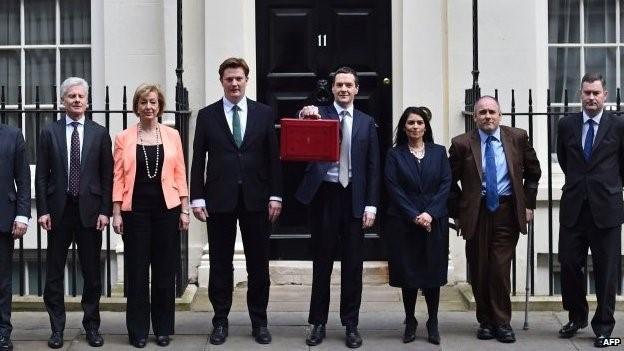After 'northern powerhouse' - a Midlands 'energy catapult'
- Published
- comments

Mr Osborne's Budget marks 50 days to go until the general election
Exactly 50 days to go to the election comes a Budget which we'd been told would be crucial to the outcome.
Why?
Because polling suggests that just as Labour are most listened to when they are talking about the NHS - hence Ed Miliband's instant attack on Mr Osborne for making no reference to investment in the health service - it's the Conservatives who command attention when they talk about the economy.
Strategists call it "traction".
Our own BBC audience research suggests Midlanders do pay more attention to business-related stories than the average for viewers and listeners across the UK as a whole.
Our region is certainly more prone to the ups and downs of the economy than most, and when you tie that in to an area famous for its marginal seats you can see what a highly-charged combination we have here.
Prime movers
So what did Mr Osborne have to say to a region where we have been chuntering "What about us?", ever since he set out his vision of a "northern economic powerhouse" last summer?
Finally, in his sixth and last Budget of the present Parliament, came his answer. The north may have its powerhouse. We have a catapult - and it's Birmingham.
The city is at the centre of a £60m investment plan called the Energy Research Accelerator for critical long-term areas such as thermal energy and energy storage, which are expected to play such an important part in our long-term strategy.
And, the universities of Birmingham, Aston and Warwick are to be the prime movers in delivering it.
Warwick's vice chancellor Sir Nigel Thrift enthused: "It will enable the University of Warwick to create a national low carbon mobility centre, serving the automotive, commercial and off-road, marine and rail sectors by the development of energy technologies in energy storage and energy machines, drives and systems."

Labour leader Ed Miliband said the Conservatives were planning billions of pounds of secret spending cuts

Mr Osborne said Birmingham is at the centre of a £60m investment plan
Which in plain English means that some of our region's biggest engines of economic growth, Jaguar Land Rover, Rolls Royce and JCB for example, will have cutting-edge academic expertise on advanced technology energy on their very doorsteps.
These conspicuous success stories are one of the main reasons Mr Osborne was able to declare in his speech that "in the Midlands, a new job is created every 10 minutes".
This, in a region which having long lagged behind the UK average on productivity, was now significantly ahead of it, the only part of the country to have a trade surplus with China.
The big test of course will be whether this new mood of optimism feeds through to the ballot box.
'Wages lower'
We used to call it "the feel good factor" and yet it is well remembered by Westminster-watchers that John Major's Conservative government went down to its landslide defeat by Tony Blair's Labour Party in 1997 even though the economy was generally performing strongly.
But according to Ed Miliband, the economy is performing anything but strongly for most people in areas like ours.
When he rose to deliver what's widely regarded as the most difficult speech in politics, the opposition leader's instant reply to an hour-long statement, which was not pre-announced, he told the Commons average wages would be £16,000 a year lower than when Labour left office.
He also warned that the Conservatives were planning billions of pounds of secret spending cuts, including to the NHS, if they were returned to power.
There was no question this Budget, despite its well-trailed lack of "gimmicks and giveaways" was nevertheless a microcosm of the main campaign themes that will be played out during the run-up to polling in exactly 50 days' time.